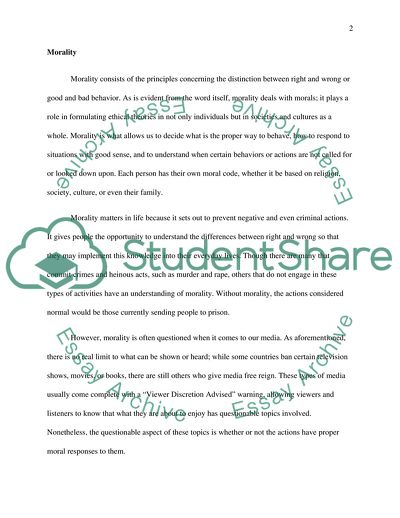Cite this document
(Media: Morality and Why It Matters Coursework Example | Topics and Well Written Essays - 2500 words, n.d.)
Media: Morality and Why It Matters Coursework Example | Topics and Well Written Essays - 2500 words. https://studentshare.org/media/1740818-in-what-ways-are-the-media-a-part-of-our-ethical-environment-explore-this-question-in-relation-to-one-of-the-topics-morality-and-why-does-it-matter-privacy-and-surveillance-freedom-of-speech-censorship-and-c
Media: Morality and Why It Matters Coursework Example | Topics and Well Written Essays - 2500 words. https://studentshare.org/media/1740818-in-what-ways-are-the-media-a-part-of-our-ethical-environment-explore-this-question-in-relation-to-one-of-the-topics-morality-and-why-does-it-matter-privacy-and-surveillance-freedom-of-speech-censorship-and-c
(Media: Morality and Why It Matters Coursework Example | Topics and Well Written Essays - 2500 Words)
Media: Morality and Why It Matters Coursework Example | Topics and Well Written Essays - 2500 Words. https://studentshare.org/media/1740818-in-what-ways-are-the-media-a-part-of-our-ethical-environment-explore-this-question-in-relation-to-one-of-the-topics-morality-and-why-does-it-matter-privacy-and-surveillance-freedom-of-speech-censorship-and-c.
Media: Morality and Why It Matters Coursework Example | Topics and Well Written Essays - 2500 Words. https://studentshare.org/media/1740818-in-what-ways-are-the-media-a-part-of-our-ethical-environment-explore-this-question-in-relation-to-one-of-the-topics-morality-and-why-does-it-matter-privacy-and-surveillance-freedom-of-speech-censorship-and-c.
“Media: Morality and Why It Matters Coursework Example | Topics and Well Written Essays - 2500 Words”. https://studentshare.org/media/1740818-in-what-ways-are-the-media-a-part-of-our-ethical-environment-explore-this-question-in-relation-to-one-of-the-topics-morality-and-why-does-it-matter-privacy-and-surveillance-freedom-of-speech-censorship-and-c.


